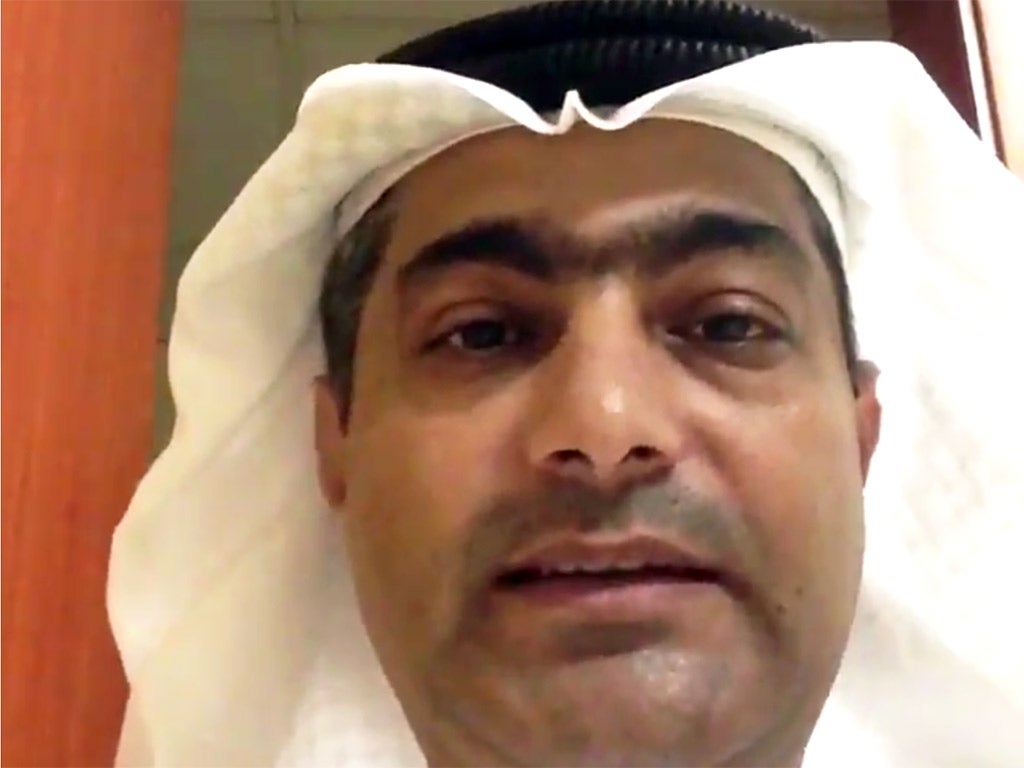UAE human rights activist Ahmed Mansoor kept in 2m x 2m cell for 4 years
Prominent government critic has spent years in total isolation without any means of contacting his loved ones

Your support helps us to tell the story
From reproductive rights to climate change to Big Tech, The Independent is on the ground when the story is developing. Whether it's investigating the financials of Elon Musk's pro-Trump PAC or producing our latest documentary, 'The A Word', which shines a light on the American women fighting for reproductive rights, we know how important it is to parse out the facts from the messaging.
At such a critical moment in US history, we need reporters on the ground. Your donation allows us to keep sending journalists to speak to both sides of the story.
The Independent is trusted by Americans across the entire political spectrum. And unlike many other quality news outlets, we choose not to lock Americans out of our reporting and analysis with paywalls. We believe quality journalism should be available to everyone, paid for by those who can afford it.
Your support makes all the difference.A prominent Emirati rights activist has been held for four years in a tiny solitary confinement cell with no bed or mattress in the United Arab Emirates, according to Human Rights Watch.
The global rights group said that Ahmed Mansoor, a 51-year-old engineer, has been forced to sleep on the floor with no bed or pillow in a cell measuring just two metres by two metres since December 2017. He has spent that time entirely alone in his cell in a desert prison.
Citing sources with a direct knowledge of Mansour’s trial, as well as interviews with two former prisoners detained alongside him, HRW said that when he is allowed into the exercise yard or to the prison clinic all other inmates are removed ahead of time, leaving him in total isolation.
The new report also sheds light on his closed-door trial for the first time, revealing that he has repeatedly and unsuccessfully protested of being held in solitary and being denied basic prisoner rights including access to phone calls and family visits.
The UAE authorities have repeatedly and vehemently dismissed the claims of poor treatment as “baseless”, saying in a statement carried by the official news agency WAM last year, that the NGO reports were spread “to distort and fabricate facts based on their particular agenda”.
In 2019, the Emirati authorities also rejected claims by United Nation human rights experts that Mansoor may be suffering treatment amounting to torture.
“Damning new details reveal just how cruelly the UAE has been treating Ahmed Mansoor, its most celebrated human rights activist, a man who courageously stood up to his abusive government, demanding it respect human rights when very few would dare,” said Michael Page, HRW’s deputy Middle East director about Wednesday’s report. “The UAE authorities’ railroading of Ahmed Mansoor shows their utter contempt for the rule of law and their determination to intimidate its critics into silence by any means necessary.”
Mansoor, a vocal critic of the government on social media, was sentenced to 10 years in prison in 2018 for insulting the “status and prestige of the UAE and its symbols” including its leaders.
Prior to his arrest almost three years ago, Mansoor had, according to HRW, dedicated over a decade of his life to advocating for human rights in his country and the wider Middle East and North Africa region despite efforts to silence him.
Damning new details reveal just how cruelly the UAE has been treating Ahmed Mansoor, its most celebrated human rights activist, a man who courageously stood up to his abusive government, demanding it respect human rights when very few would dare
Mansoor, an electrical engineer and poet, was among five activists convicted of insulting the UAE’s rulers in 2011. They were pardoned the same year. But Mansoor was placed under a travel ban and according to HRW has been subject to multiple sophisticated hacking attempts.
In a May 2019 report, UN human rights experts said that Mansoor had been kept in solitary confinement “in conditions of detention that violate basic international human rights standards and which risk taking an irrevocable toll on Mr Mansoor’s health.”
At the time, state media WAM cited a statement from the UAE’s Permanent Mission to the United Nations in Geneva, where it dismissed the UN claims as “false and unsubstantiated” and aimed at “distorting and falsifying facts”.
The UAE has come under increasing pressure to improve its human rights record and do more to avoid civilian casualties in an air campaign against Iran-backed Houthi rebels in the war in Yemen.


Join our commenting forum
Join thought-provoking conversations, follow other Independent readers and see their replies
Comments